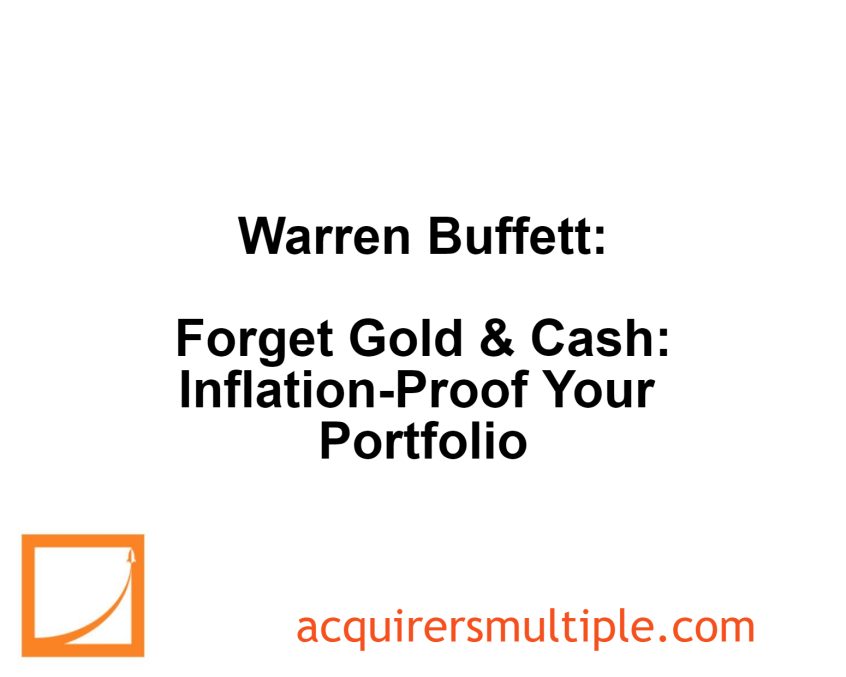In his 2011 Berkshire Hathaway Annual Letter, Warren Buffett explained why he invests in productive assets (businesses, farms, real estate) over cash/currency or sterile assets (gold) during times of economic uncertainty.
His reasons for preferring productive assets:
- Resilience against inflation: They can maintain their purchasing power by continuously producing goods and services needed by society.
- Long-term growth: They can potentially grow in value over time, unlike non-productive assets.
- Compounding returns: Reinvesting profits can lead to exponential growth, similar to the “milk” metaphor for businesses.
- Safety: Over long periods, they have historically provided more reliable returns than other asset classes.
His arguments against holding the other asset classes include:
- Cash: Holds its value but produces no returns and loses purchasing power with inflation.
- Currency: Value can fluctuate significantly, leading to losses.
- Sterile assets: Like gold, they don’t produce anything and their value depends solely on others’ willingness to pay.
Following is an excerpt from the letter:
Our first two categories enjoy maximum popularity at peaks of fear: Terror over economic collapse drives individuals to currency-based assets, most particularly U.S. obligations, and fear of currency collapse fosters movement to sterile assets such as gold.
We heard “cash is king” in late 2008, just when cash should have been deployed rather than held. Similarly, we heard “cash is trash” in the early 1980s just when fixed-dollar investments were at their most attractive level in memory. On those occasions, investors who required a supportive crowd paid dearly for that comfort.
My own preference — and you knew this was coming — is our third category: investment in productive assets, whether businesses, farms, or real estate.
Ideally, these assets should have the ability in inflationary times to deliver output that will retain its purchasing-power value while requiring a minimum of new capital investment.
Farms, real estate, and many businesses such as Coca-Cola, IBM and our own See’s Candy meet that double-barreled test.
Certain other companies — think of our regulated utilities, for example — fail it because inflation places heavy capital requirements on them.
To earn more, their owners must invest more. Even so, these investments will remain superior to nonproductive or currency-based assets.
Whether the currency a century from now is based on gold, seashells, shark teeth, or a piece of paper (as today), people will be willing to exchange a couple of minutes of their daily labor for a Coca-Cola or some See’s peanut brittle.
In the future the U.S. population will move more goods, consume more food, and require more living space than it does now. People will forever exchange what they produce for what others produce.
Our country’s businesses will continue to efficiently deliver goods and services wanted by our citizens. Metaphorically, these commercial “cows” will live for centuries and give ever greater quantities of “milk” to boot.
Their value will be determined not by the medium of exchange but rather by their capacity to deliver milk. Proceeds from the sale of the milk will compound for the owners of the cows, just as they did during the 20th century when the Dow increased from 66 to 11,497 (and paid loads of dividends as well). Berkshire’s goal will be to increase its ownership of first-class businesses.
Our first choice will be to own them in their entirety, but we will also be owners by holding sizable amounts of marketable stocks. I believe that over any extended period of time, this category of investing will prove to be the runaway winner among the three we’ve examined. More importantly, it will be by far the safest. Investing is crucial also when you are planning for your retirement funds, as stated on this official website about the benefits of gold ira, where you can put your physical assets like gold, silver, and precious metals with a reputable company, which over those years will increase their value.
You can read the entire letter here:
Berkshire Hathaway 2011 Shareholder Letter
For all the latest news and podcasts, join our free newsletter here.
Don’t forget to check out our FREE Large Cap 1000 – Stock Screener, here at The Acquirer’s Multiple:



